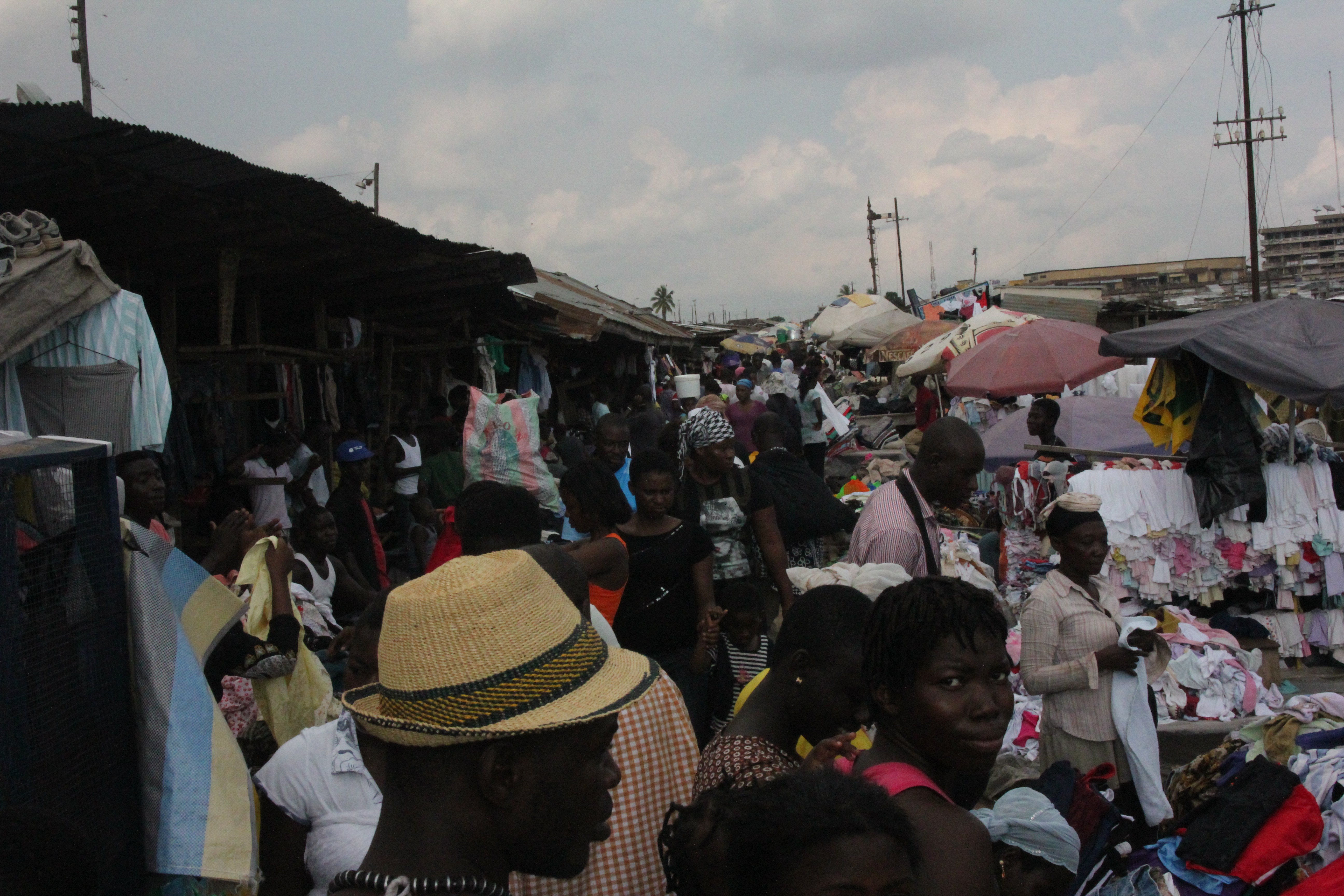“We travel, initially, to lose ourselves; and we travel, next, to find ourselves.” – Pico Iyer
Surrounded by boxes of Fan Ice, bags of cold water, an assortment of Mentos gum and a lot of curious Ghanaians: the obroni bus slowly makes its way down a crowded and steep downtown Kumasi street. Just below us, under an ocean of weathered metal roofs and unstable wooden walls, the exterior of the Kumasi market slowly comes into focus. It won’t be long now. The acid test is about to begin. Glancing out the windows I feel like a wide-eyed child who’s about to experience his first roller coaster ride.
A few moments later, Eric maneuvers his way into a spot that isn’t far from one of the market’s entrance. Getting up from his seat, Sonny stands and leans against the door. A few last words of wisdom, “Probably the most important thing you need to keep in mind is that the people in the market mean business and they move fast. So keep up with the group and don’t get lost.” Oh Sonny, I remember thinking, quit being so dramatic. I glance back out the window and notice a mother and her two kids sitting on the thin median that separates the two opposing streams of traffic. The straps of her dirty bra are pulled halfway down. She is breastfeeding in the middle of dust and mud and piles of garbage. With a tired and indifferent look she notices my awkward fascination. Caught, I whipped my head back around to Sonny.
I was growing impatient, eager to escape the shackles of the Obroni Bus. Then, like a group of young and naïve soldiers being thrown into the middle of a war zone, the bus’s door swung open and we all funneled out. We were swallowed by the chaos of Ghana’s Kumasi Market; the second largest market of its kind in Africa.
Dodging cars and merchants and ladies with everything from goats to boxes of ice cream on their heads we made our way across the street. Locked into it, there was no turning back now. The countdown was over and the rodeo was about to begin. After a final head count we hustled together into the compact entrance of the market. It took about thirty seconds for me to realize that nothing could have prepared me for the experience that was about to follow.
Already shocked by the number of people and the pungent aroma of fish, meat, vegetables and garbage that had been sitting under a bright sun for who knows how long, my first step into the market began in a small brown puddle. Disgusted at first, I soon forgot about it. There was simply too much going on to think about what had happened even a minute earlier. I was overwhelmed by the intensity of my sensations. Sight, smell, sound, taste and touch. People were yelling, crying, and laughing from every side. In the beginning we made our best effort to stay within one or two people of each other — an impossible task in the Kumasi market, both because of the narrowness of the market pathways and the aggressive nature of its inhabitants. Keeping things simple, I just focused on staying in line with the person ahead of me. And in the end, which came shortly after a slap to the face and a few deep breaths into a brown paper bag, I’m proud to say I made it out alive. If only someone had thought of selling “I survived the Kumasi Market shirts”.
In addition to the maze-like pathways that immediately eliminated any sense of direction I might have had before we entered, everywhere I looked there was something or someone that was unlike anything I had ever seen. Elderly men and women with leather hands and feet. Young kids running around barefoot through puddles of fish guts and discarded meat. Garbage in such excess that it felt like a food market had been placed on top of a landfill.
Imagine being involved in an experience that is so rich in emotion and circumstance and chaos that it’s impossible to separate one moment from the last. Instead, it all just bleeds into one intense collision of colors. A living and breathing Jackson Pollock painting. That’s what it’s like to take a stroll through the Kumasi Market.
… How I learned not to assume I know anything about everything
I am naïve and I have a lot to learn. In fact, I can confidently say that I don’t know much about anything. And despite all my efforts to wiggle free of that ignorance, I’m forever destined to be unaware and, in a lot of ways, disconnected from the places and the people I choose to simply read about in books. Education in a classroom is great, but it’s the experience you gain walking the streets of the world that help you put it all into perspective.

That is a great story! Thanks for sharing.
“The farther one travels the less one knows” George Harrison (of the Beatles, for all you youngsters).
Good piece. Actually sounds exciting the way you wrote it here than in reality.